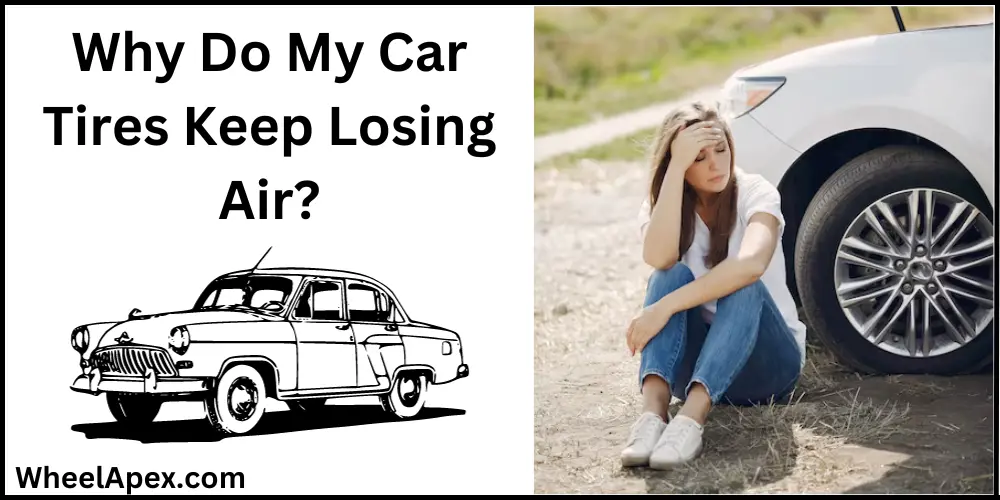The continuous loss of air from car tires is a common concern for many drivers. It not only leads to decreased fuel efficiency. It can also compromise the protection and handling of your vehicle. Comprehending the logic behind this phenomenon is important. For maintaining your tires and ensuring a smooth, safe ride. Why do my car tires keep losing air? In this article, we will investigate the different factors. That causes your car tires to lose air. Also, discuss the significance of regular maintenance.
Why Do My Car Tires Keep Losing Air?
It’s essential to recognize that all tires lose some air over time. Why do my car tires keep losing air? This is fundamental. Because of the porousness of the elastic, temperature changes, and different components. In the center, a tire can lose around 1-3 psi (pounds per square inch) of pneumatic stress each month. Thus, it is typical for your tires to have occasional top-ups. To maintain the recommended pressure levels maintain the coefficient of friction.
There could be several reasons for your car tires losing air, including punctures, damaged valve stems, or corroded rims. It’s important to have a professional inspect your tires to identify and fix the issue promptly.
Temperature Fluctuations
Temperature variations play a significant role in tire pressure fluctuations. At the point when the weather conditions turn colder. The air inside your tires contracts, causing a reduction in pressure. In warm climates, the air inside the tires expands, prompting higher tension. These temperature-related contrasts can in some cases be significant. So it’s important to study and adjust your tire pressure to ensure. It falls within the manufacturer’s recommended range.

Punctures and Leaks
One of the most common reasons for continuous air loss in car tires is punctures and leaks. Road debris, sharp objects, and even small punctures from nails or screws. That can create openings in the tire’s structure. These punctures allow air to escape, leading to gradual deflation. It’s crucial to inspect your tires for visible damage and repair any punctures. To prevent further air loss and extend the tire’s lifespan.
Damaged Valve Stems
Valve stems are the fundamental parts that permit you to blow up and collapse your tires. They are inclined to harm, wear, and tear over time. If your valve stems are leaking, air can escape from your tires. Replacing damaged or faulty valve stems. It is a straightforward and inexpensive solution to stop air loss.
Bead Seal Issues
The bead seal is where the tire meets the rim, forming an airtight seal. If this seal is compromised, air can escape, resulting in gradual deflation. Bead seal issues can occur due to corrosion, damage, or improper installation. If you suspect a bead seal problem, consult a professional to assess and resolve the issue.
Aging Tires
As tires age, the rubber can become more porous, making them more susceptible to air loss. It’s fundamental to review your tires for indications of maturing. Like breaks, dry decay, or lopsided wear. If your tires are nearing the end of their lifespan. Consider replacing them to maintain optimal safety and performance.

Improper Installation
Sometimes, improper tire installation can result in air loss. This can include not sealing the tire. With the rim during mounting or using damaged or mismatched components. Ensure that you have your tires installed by a reputable professional. To prevent installation-related air loss issues.
FAQs
Why Does My Tire Keep Losing Air But No Hole?
If your tire keeps losing air but has no visible hole. It could be due to a leaking valve stem, a damaged wheel, or a bead seal issue. These problems can be difficult to detect without professional inspection. So it’s advisable to have a mechanic check for the source of the slow leak.
How Do You Fix A Tire That Keeps Losing Air?
To fix a tire that keeps losing air, start by checking for punctures or leaks. Inflate the tire, then submerge it in soapy water to reveal bubbles where air escapes. Repair small punctures with a patch or plug, and for larger issues. Consult a professional mechanic for a thorough inspection and repair.
How Often Should You Put Air in Your Tires?
You should check and adjust your tire pressure at least once a month to ensure the tires are inflated. Regular maintenance helps improve fuel efficiency and tire longevity. Safety by preventing underinflation or overinflation and maintaining optimal traction and handling.
How Do I Know if My Tire Valve is Leaking?
To check for a leaking tire valve, mix a soapy water solution and apply it to the valve stem. If you see bubbles forming, it indicates a leak. Additionally, listen for a hissing sound and check your tire’s pressure. A gradual loss may also show a valve issue.
Can Hitting A Pothole Cause A Tire to Lose Air?
Hitting a pothole can indeed cause a tire to lose air. The impact can damage the tire’s sidewall or create small punctures, leading to slow leaks. It’s essential to check tire pressure and inspect for damage. After encountering potholes to maintain safe and efficient driving.
Conclusion:
The continuous loss of air from car tires is a common issue with various underlying causes. While some air loss is normal due to temperature fluctuations furthermore, normal penetrability. Why do my car tires keep losing air? It’s urgent to address any unusual and tenacious loss of strain. Ordinary tire support, visual examinations, and legitimate. Consideration can help distinguish and relieve the reasons for air misfortune. Guarantee that your tires stay in great shape.
Add to a more secure and more proficient driving experience. On the off chance that you at any point experience determined air misfortune. Or are uncertain about the state of your tires. Counseling an expert repairman or tire expert for an intensive investigation. Important fixes or replacements are prudent. Remember, maintaining proper tire pressure is not only about saving money and fuel. Also about ensuring your safety on the road.
Sources:
- By Thang Nguyen Why do our tires keep losing air, even with no visible punctures? What could be the reason and how do you fix it? Posted 1 Year Ago.

